I am thrilled because I have been given the opportunity to make my very own maple syrup this year ... and I get to share the experience with you! Tap My Trees has graciously provided me with a maple sugaring starter kit and compensated me for my time and efforts.
First, a little back story...
I have lived in my current home for about three years. Before that I lived in a condo where there was no earth that I could call my own. My husband and I didn't have too many requirements when we bought our new home except that we wanted four bedrooms and a little bit of land. In my area, having any land is not the norm, so we were thrilled to find a street filled with 1 acre lots.
We have thoroughly enjoyed having some ground to call our own, but we have had a big learning curve! When we first moved in, I couldn't tell a weed from a flower. I'm learning a lot, but still have a long ways to go. For instance, I know that we have a bunch of maple trees in our yard, but what kind of maples are they? I had no clue.
Identifying Your Maple Trees
Sugar Maples are the best kind of maple trees to tap, but did you know that you can tap any maple tree? The difference is that each type of tree has a different sugar content in its sap. The higher the sugar content, the less sap you will need to collect to make your syrup. So a good place to start is to figure out what type of maple tree you have.
There are many types of maple trees, but here are a few that are common in my area (and hopefully yours). For more detailed information Tap My Trees has some helpful identification pages, or else just search on Google and you will find all kinds of pages filled with pictures and charts to help you identify your trees! Hopefully this will help you get started, though...
 Sugar Maple:
Sugar Maple:
Leaf: 5 lobed, 3-5 inches wide, smooth margin
Bark: Dark brown with vertical grooves
Fall Color: Bright yellow, orange, or red
 Black Maple:
Black Maple:
Leaf: Usually 3 lobed, appears to be drooping, 4+ inches wide
Bark: Dark brown with vertical grooves
Fall Color: Bright yellow, orange, or red
Red Maple:
Leaf: 3 lobed, 2-6 inches wide, serrated margin
Bark: Dark with gray or black scaly plates
Fall Color: bright red
 Silver Maple:
Silver Maple:
Leaf: 5-7 inches wide, silvery underside, fine teeth on margin
Bark: Reddish brown, appears shaggy on mature trees
Fall Color: Mainly yellow
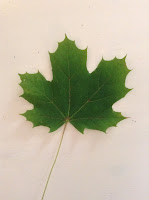 Norway Maple:
Norway Maple:
Leaf: 5 lobes, 3-9 inches wide, tips end in a fine point, usually green but can also be a deep purple
Bark: brown, shallow grooves
Fall Color: usually yellow
What Kind of Maple Trees Do You Have?
Do any of these look familiar? It turns out that I have a few Norway maples and a Silver maple. Now I have to make a decision...What tree should I tap? My Norway maples are very healthy and a perfect size for tapping, but they are not usually used because of their lower sugar content. Silver maples have a decent sugar content, but mine is really big and not in the greatest condition. Which would you choose? Please leave a comment if you have any advice!
One of my healthy Norway Maples
My sickly Silver Maple
Supplies Needed for Tapping Maple Trees
Making maple syrup is something that I have wanted to do for a long time, but I am completely clueless about the whole process (or at least I was!) so I never got the courage to give it a try. I was thrilled to find out about Tap My Trees. Making syrup is their business and they make it so easy for others who want to do it too!
All you have to do is go to Tap My Trees and order a starter kit and you will have everything you need. I received the Starter Kit for Teachers which also included a handy guide that walks you through the whole process step by step. So now I have everything I need and I know exactly what to do. THANK YOU, Tap My Trees!
(Did you know that you can find Tap My Trees on Amazon.com too? Lots of options! Can't go wrong either way.
Here is what the Starter Kit for Teachers includes:
- Maple Sugaring Lesson Plan: Lesson plan for the maple sugaring process. Can be adapted for third grade through high school.
- Maple Sugaring at Home book: This guide provides step-by-step instructions (complete with pictures) to tap maple trees. Includes information on how to identify maple trees, how to tap trees, collection and storage of sap, uses for maple sap including how to make maple syrup, and frequently asked questions.
- 1 Aluminum Bucket: 2 gallon aluminum bucket is used to collect the sap as it drips from the spile.
- 1 Metal Lid: Lids prevent rain, snow, and foreign material from entering the bucket.
- 1 Spile with Hook: Stainless steel spile (tap) is inserted into drilled hole to transfer sap into the bucket. Hook is used to hold the bucket.
- 1 Drill Bit: 7/16 drill bit with 3/8 shank used to drill tap hole into your maple tree.
- Cheesecloth: Used to filter any solids (such as pieces of bark) when transferring sap from the collection bucket to a storage container.
- Filter: 24" X 30" filter sheet to filter sediment from finished syrup. Durapure grade filter.
- 1 Bottle with Lid: Empty 12 oz. maple syrup bottle used to store finished syrup.
- Thermometer: Candy thermometer for making maple syrup. Instrument Range: 100 to 400°F / 40 to 200°C. Stainless steel housing with mounting clip
That's a lot of stuff and most of it will service you well year after year!
Preparing to Tap Your Trees
What do you think? Do you want to give this a try along with me? Sugaring time is typically around February or March (depending on where you live and how the weather is behaving in that given year), so now is a great time to get your supplies. A Maple Sugaring Kit would make an awesome Christmas gift to give (or ask for!) don't you think? If all goes well this year, I'll be asking Santa for extra buckets so we can tap more of our trees! If you have more trees to tap like I do, check out this starter kit that comes with three buckets, spiles, hooks. etc.
So what do you need to do between now and February?
- Identify the best trees in your yard (make sure it is at least 12 inches in diameter)
- Take some time to learn about everything involved in the sugaring process. Tap My Trees shares some great ideas for incorporating history, science, math, and more into your learning!
- Help your child get excited by reading great books about making maple syrup:



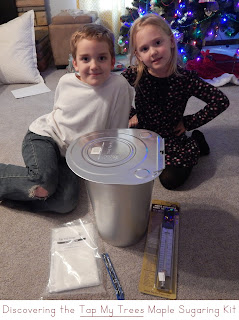

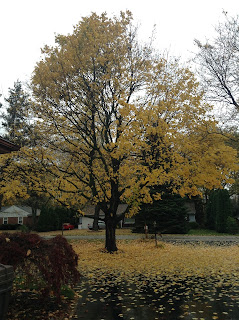

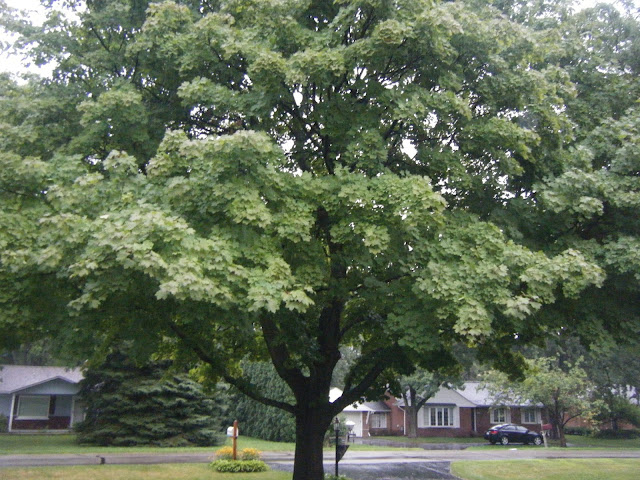
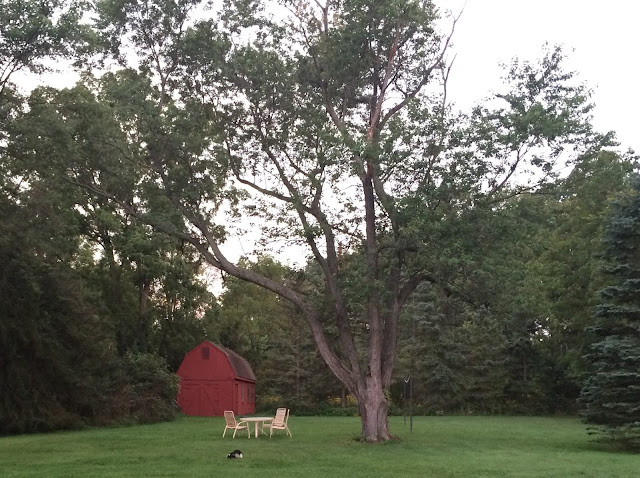



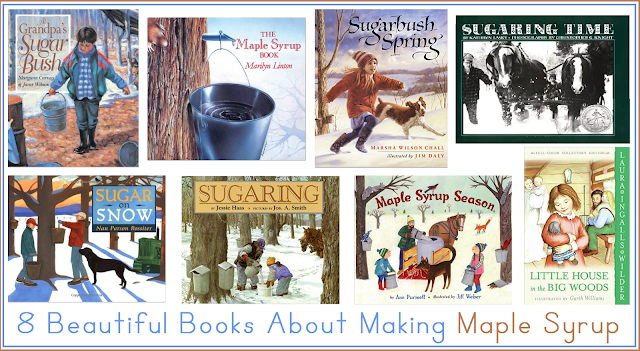


So fun that you're doing this Amy! Sarah and I just finished reading Miracles on Maple Hill which is a beautiful story to add to this list! Your kids would love it. :)
ReplyDeleteI'm so glad you mentioned that book! I actually have it on my bookshelf. Is it sad that I can't even remember what books I own? ;)
DeleteCan relate to that, Amy. I'm giving myself the challenge to read the books I already have on my shelves in 2016.
DeleteI wonder if maple sugaring requires cold weather?? We have maples growing over here but we obviously don't get the extreme cold. I just haven't heard of anyone trying to get maple sugar out of ours.
ReplyDeleteYou are exactly right. It needs to be done late winter/early spring when the sap starts flowing back up the tree after a dormant season. It needs to be during the time when the temperature in the day time starts to rise above freezing but at night the temperature goes back below freezing. I think it is a period of just a few weeks around here.
DeleteThat explains the exorbitant cost of the stuff over here. Have a great Christmas, Amy!
DeleteTapping maple trees looks like so much fun! You're fortunate to have a couple trees in your yard. :-)
ReplyDeleteI'm excited to give it a try! Maple trees are all over where I'm at. If you like maple syrup, Michigan is a great place to be =)
Delete